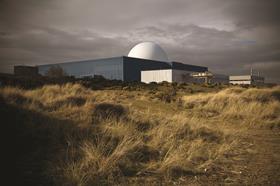Report says decision puts at risk nuclear new build programme

The government’s plans to quit the Euratom treaty pose a fresh threat to the UK’s increasingly embattled nuclear new build programme, a new report has warned.
Last month Brexit secretary David Davis confirmed its intention to pull out of Euratom, the European nuclear research agency that predates the European Union and its predecessors. The plans were included in explanatory notes to the Brexit Bill.
The decision was criticised by Tom Greatrex, the chief exectuive of the Nuclear Industry Association, who said: “The UK nuclear industry has made it crystal clear to the government that our preferred position is to maintain membership of Euratom. The nuclear industry is global, so the ease of movement of nuclear goods, people and services enables new build, decommissioning, R&D and other programmes of work to continue without interruption.”
Now a new study by the Institute of Mechanical Engineers (IME) says the government’s plans to quit the treaty could imperil fuel supplies, jeopardising energy security as well as threatening plans to build new nuclear reactors and decommissioning activities.
The IME said the government should create a transitional framework for the nuclear industry instead and as well as create new nuclear cooperation agreements (NCAs) with Euratom and non-EU trading countries ahead of leaving Euratom.
In particular, nuclear goods, services and research activities should be part of any new trade deals negotiated with the US, Canada, Australia, China and South Africa.
Dr Jenifer Baxter, head of energy and environment at IME and lead author of the report, said: “Without suitable transitional arrangements, the UK runs the risk of not being able to access the markets and skills that enable the construction of new nuclear power plants and existing power stations may also potentially be unable to access fuel.
“There needs to be a thorough framework in place to provide assurances on nuclear safety, nuclear proliferation and environmental issues.
Last week, the government’s nuclear new build ambitions were branded “pie in the sky” by an international energy expert who said it would not be able to afford the level of capital support required.
Reports suggested the Treasury was looking to sweeten deals for private investors by taking stakes in new nuclear power stations, worth up to 30%. But Mycle Schneider, who has advised a number of European governments on nuclear issues, said: “We are taling about very large sums of money. This is pie in the sky.”



























No comments yet